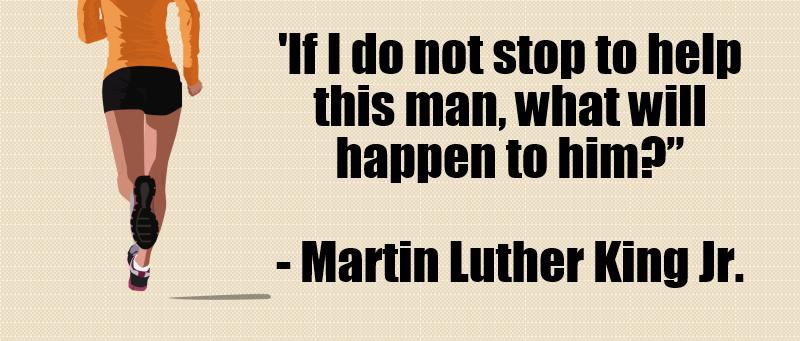Psychological studies have shown that people's ethical behavior is often out of sync with their sincerely held moral beliefs. Disturbing examples of this phenomena include the Standford Prison Experiments, where subjects tasked with being prison "guards," became increasingly more brutal towards "inmates." A less well know study conducted by Darley and Batson among seminarians, found that students who said they wanted to enter the ministry in order to help people where likely to ignore a person in distress depending on the circumstances.
Does the Darley and Batson study indicate that people actually aren't as moral as they think they are? Maybe. Or is it that people are just so mindlessly busy and self absorbed that they don't stop to focus on what is happening around them? Does distraction act as an impediment to helping others?
Epictetus argued that mindfullness, also known as prosoche, (which can be translated as ‘attention’) is essential for living an ethical life. Mindfullness is the antidote to the distracted, self-absorbed state that many people walk around in.
Darley and Batson met with a group of seminarians, individually, and asked each one to prepare a short, extemporaneous talk on a given biblical theme, then walk over to a nearby building to present it. Along the way to the presentation, each student ran into a man slumped in an alley, head down, eyes closed, coughing and groaning. The question was, who would stop and help?
Martin Luther King pointed out that what is notable about the story of the Good Samaritan, is rather than worrying about inconvenience to himself if he stopped, the Samaritan wondered, "If I do not help this man, what will happen to him?"
Distractedness as an Impediment to Empathy
Gladwell thinks:
What this study is suggesting, in other words, is that the convictions of your heart and the actual contents of your thoughts are less important, in the end, in guiding your actions than the immediate context of your behavior. The words “Oh, you’re late” had the effect of making someone who was ordinarily compassionate into someone who was indifferent to suffering—of turning someone, in that particular moment, into a different person.
I don't share Gladwell's conclusion about this particular study - that convictions and thoughts are less important than the context of behavior.
My view is that it's our state of mind, not the situation per se, that matters. It seems that the test subjects were so busy rushing around that their distraction became an impediment to acting in accord with their moral beliefs.
You see, sometimes we are so harried trying to get something done that we have tunnel vision and we ignore other things. In the moment, we forget to align our thoughts with the convictions of our hearts, as Gladwell puts it.
Focus Your Mind Attentively
Marcus Aurelius thinks that we can avoid tunnel vision and cultivate mindfulness by bringing our thoughts back to the task at hand:
"Every hour focus your mind attentively…on the performance of the task in hand, with dignity, human sympathy, benevolence and freedom, and leave aside all other thoughts. You will achieve this, if you perform each action as if it were your last…" (Meditations 2.5.)
Epictetus noted that once you loose mindfulness, you loose your perspective:
"Do you not realize that when once you have let your mind go wandering, it is no longer in your power to recall it, to bring it back to what is right, to self-respect, to moderation?’ (Discourses 4.12.)
I frequently have to tell myself to stop, slow down, and focus exclusively on what I am doing or what is happening around me, instead of thinking about the next thing I want to get done.
I'm much more likely to ignore something or to be short tempered with someone when I loose perspective on the moment. The key is being present enough to notice my mind wandering and return to prosoche.
What do you think? Have you ever made a conscious effort to stop and help someone in need? Please leave a comment below.
~










